Princeton University is in the lovely town of Princeton, New Jersey. It was established way back in 1746. This Ivy League school has a bunch of cool fun facts that tell us about its history. Let’s dive into Princeton’s past and find some interesting stories that have made it what it is today.
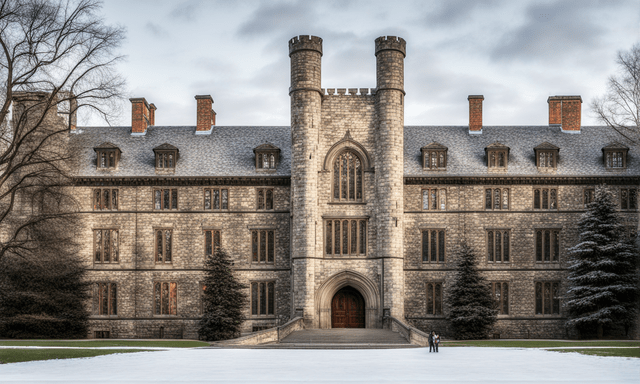
A noteworthy tidbit from Princeton’s past is its original name, the College of New Jersey. This name was held until the institution was renamed Princeton University in 1896. Another historical gem is the pivotal role played by Princeton’s Nassau Hall during the American Revolutionary War, serving as a hospital and housing for soldiers. These facts illuminate the university’s transformative journey from a small colonial college to a globally renowned educational powerhouse.
Furthermore, Princeton University has been home to a constellation of prominent alumni, including former U.S. Presidents James Madison and Woodrow Wilson. The university’s celebrated tradition of iconic class reunions began in 1912, which continues to this day, fostering lifelong connections among graduates. As we embark on this fascinating journey through Princeton’s history, we’ll uncover more captivating nuggets that have made this institution an academic beacon for centuries.
Also Read this: 15 Unbelievable Facts About the University of Oregon
Quick Fun Facts about Princeton University
A Storied Past
- Origins as the College of New Jersey: Founded in 1746, the university initially bore the name “College of New Jersey.”
- Honoring a Prince: The name “Princeton” was adopted to pay homage to Reverend William III, Prince of Orange, and the town’s original location.
- Presidential Alumni: It has produced two U.S. presidents, James Madison and Woodrow Wilson, who walked its hallowed halls.
Ivy League Excellence
- Ivy League Prestige: Princeton stands as one of the esteemed eight Ivy League universities, renowned for academic excellence.
- World-Renowned Ranking: Consistently ranking among the world’s top universities, Princeton’s academic prowess is truly remarkable.
- Motto and Colors: The university’s motto, “Dei sub numine viget,” meaning “Under God’s power she flourishes,” and its official colors of orange and black reflect its rich traditions.
Campus and Community
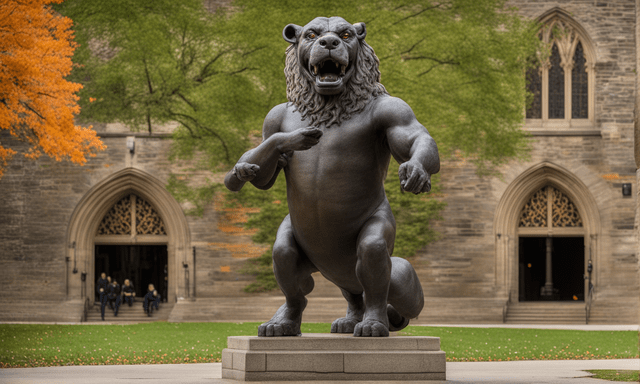
- Expansive Campus: The picturesque campus stretches across over 600 acres, providing a stunning backdrop for learning.
- Diverse Student Body: Princeton welcomes more than 5,200 undergraduates and over 2,800 graduate students from all corners of the globe.
- Majestic Mascot: The university’s spirited mascot, the tiger, roars proudly at athletic events.
Notable Alumni and Rivalries
- Acclaimed Einstein: Albert Einstein, the brilliant physicist, served as a professor at Princeton from 1933 until his passing in 1955.
- Literary Connections: F. Scott Fitzgerald, the celebrated author, attended Princeton, although he left before completing his degree.
- Rivalry with Harvard: A longstanding rivalry with Harvard University adds a spirited dimension to their sports competitions.
Academic Achievements and Recognitions
- Nobel Laureates: Princeton’s prestigious roster of alumni includes Nobel laureates like Toni Morrison, Albert Einstein, and John Forbes Nash Jr.
- The Princeton Review: The popular college guidebook, “The Princeton Review,” takes its name from this illustrious institution.
- Historic Nassau Hall: The university’s oldest building, Nassau Hall, was constructed in 1756 and stands as a testament to its rich history.
Unique Traditions and Architectural Beauty
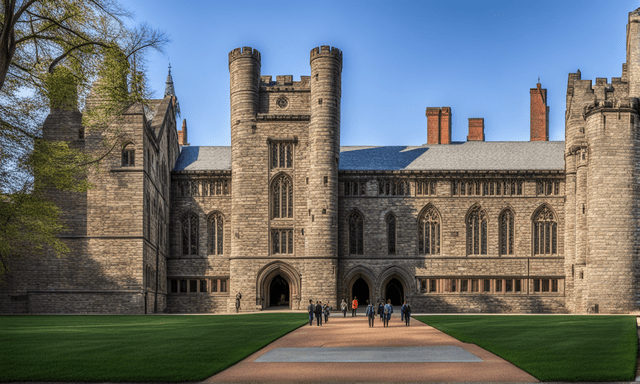
- Eating Clubs: Princeton’s unique eating club system is a social tradition that sets it apart from other universities.
- Architectural Diversity: The campus showcases an eclectic mix of Gothic, Romanesque, and modern architectural styles.
- Grand Chapel: The university’s chapel ranks among the largest university chapels globally, showcasing its commitment to spiritual well-being.
Cutting-Edge Research and Innovation
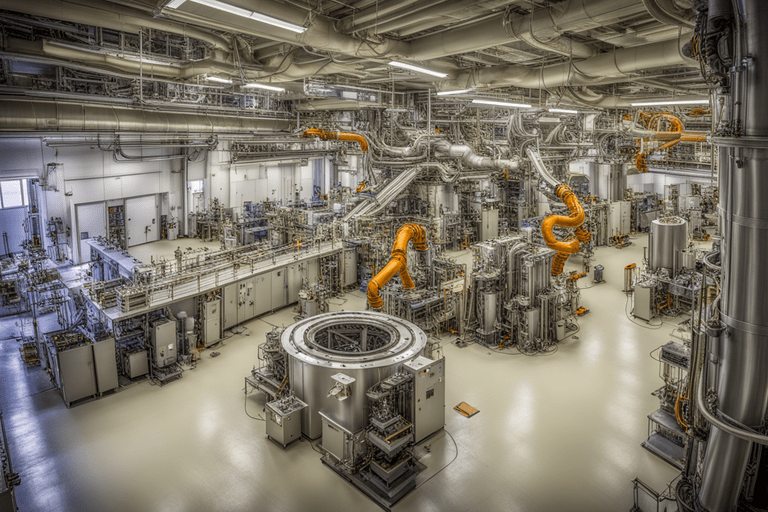
- Fusion Energy Research: The Princeton Plasma Physics Laboratory stands as one of the world’s largest centers dedicated to fusion energy research.
- Varied Student Organizations: A wealth of student organizations, from debate teams to chess clubs, offer a vibrant campus life.
- Triangle Club: The Princeton Triangle Club, the oldest touring collegiate musical-comedy group in the United States, shines in the world of performing arts.
Cultural Enrichment and Sustainability
- Artistic Treasures: The Princeton University Art Museum, housing over 100,000 artworks, invites visitors to explore a wide range of creative expressions.
- Neuroscience Excellence: The Princeton Neuroscience Institute is a renowned hub for the study of the brain and nervous system.
- Green Initiatives: Princeton’s robust commitment to sustainability makes it a leader in environmental stewardship.
Commitment to Excellence
- Outstanding Undergraduate Education: The university’s longstanding tradition of academic excellence ensures students receive a top-tier education.
- Global Leadership: The Woodrow Wilson School of Public and International Affairs stands as a beacon in the world of public policy and international studies.
- Diverse and Inclusive Community: Princeton’s commitment to diversity, equity, and inclusion is evident through numerous initiatives and programs.
Leading the Way
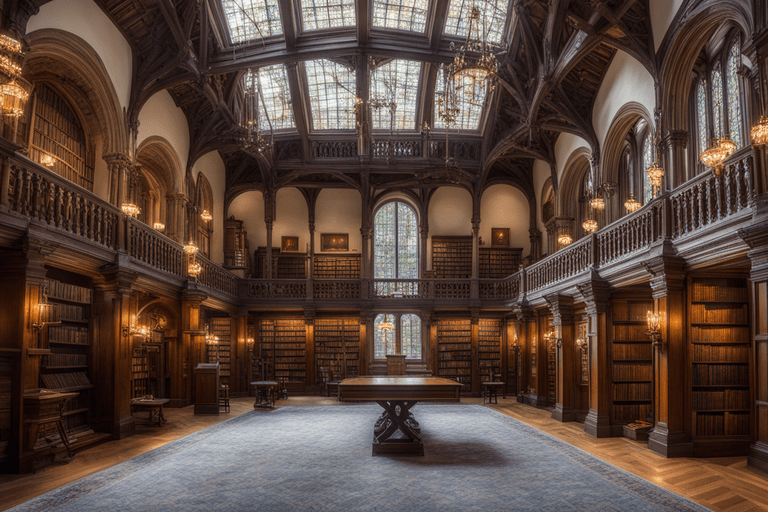
- Firestone Library: Home to the renowned Firestone Library, Princeton offers access to a vast repository of knowledge with over 70 miles of bookshelves.
- Prestigious Association: As a member of the Association of American Universities, Princeton aligns with the world’s top research institutions.
- Art for Everyone: The Princeton University Art Museum is open to the public, providing a rich cultural experience free of charge.
Encouraging Entrepreneurship and Sustainability
- Entrepreneurship Support: The university nurtures entrepreneurial spirit, offering resources and guidance to aspiring student entrepreneurs.
- Eco-Friendly Initiatives: Princeton’s commitment to sustainability extends to eco-friendly practices, from composting to green building.
- Broad Research Spectrum: The university’s research programs encompass a wide array of disciplines, spanning natural sciences, social sciences, humanities, and engineering.
History of Princeton University
Princeton University, founded in 1746 as the College of New Jersey, has a captivating history filled with remarkable milestones that have shaped its identity. Let’s delve into some of the fascinating historical facts that make Princeton stand out.
From Humble Beginnings to Prestigious Name
Discover how the university’s journey began as the College of New Jersey in 1746 and explore the intriguing choice of the name “Princeton” in honor of Reverend William III, Prince of Orange, and the town’s historical significance.
Princeton’s Presidential Legacy and Ivy League Membership
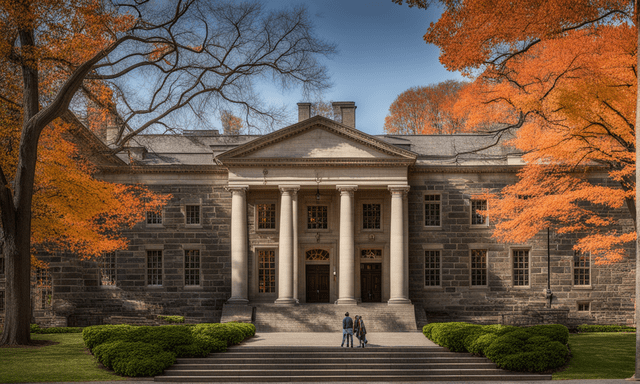
Uncover the legacy of two U.S. Presidents, James Madison and Woodrow Wilson, who were part of Princeton’s esteemed alumni. Learn how Princeton’s membership in the Ivy League solidifies its place among prestigious academic institutions.
A World-Renowned Institution
Explore Princeton’s consistent ranking among the world’s top universities and the significance of its motto, “Dei sub numine viget” (Under God’s power she flourishes), and official colors, orange and black.
Campus: A Picturesque Haven for Learning
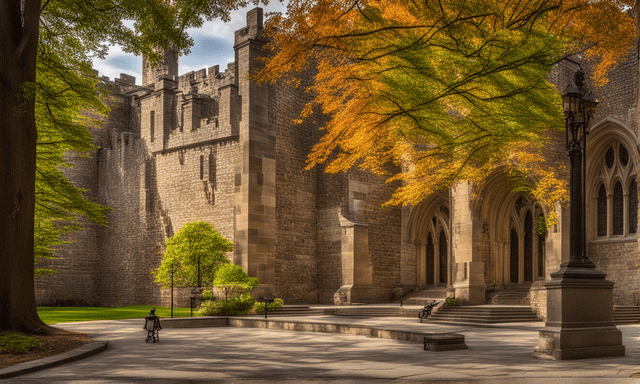
Get a sense of the university’s vast 600-acre campus and the diverse student community, comprising over 5,200 undergraduates and 2,800 graduate students. Meet the lively mascot, the Princeton Tiger.
Connections with Literary Greats and Ivy League Rivalries
Discover the significant presence of Albert Einstein at Princeton, the short-lived academic journey of F. Scott Fitzgerald, and the spirited rivalry shared with Harvard University.
Celebrated Alumni and Academic Excellence
Explore the impressive roster of Nobel laureates, including Toni Morrison, Albert Einstein, and John Forbes Nash Jr., produced by Princeton University. Dive into the history of “The Princeton Review” and the significance of Nassau Hall.
Unique Traditions and Architectural Splendor
Learn about Princeton’s distinctive eating club system and the diverse architectural styles that adorn its campus. Explore the grandeur of the university’s chapel, one of the largest university chapels globally.
Leading the Way in Research and Innovation
Discover the pioneering role of Princeton in fusion energy research through the Princeton Plasma Physics Laboratory. Explore the abundance of student organizations and the historic Princeton Triangle Club.
Enriching Cultural Experiences and Commitment to Sustainability
Uncover the treasure trove of art within the Princeton University Art Museum and the cutting-edge research at the Princeton Neuroscience Institute. Learn about Princeton’s leadership in sustainability and its commitment to community service.
A Tradition of Excellence
Delve into Princeton’s long-standing tradition of academic excellence and its global influence through the Woodrow Wilson School of Public and International Affairs. Explore the diverse and inclusive community that thrives at Princeton.
Princeton: Where Knowledge Knows No Bounds
Unearth the vast expanse of knowledge within the Firestone Library and Princeton’s esteemed membership in the Association of American Universities. Discover the cultural richness of the Princeton University Art Museum, open to all.
Nurturing Entrepreneurship and Sustainable Practices
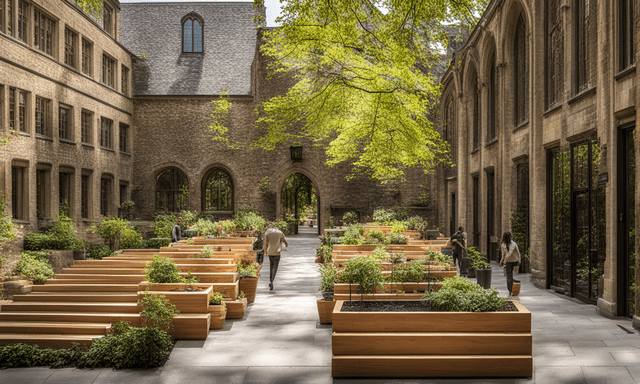
Learn about Princeton’s commitment to entrepreneurship and its support for student entrepreneurs. Explore the university’s dedication to sustainability, from composting to green building practices.
A Spectrum of Research Excellence
Uncover the wide-ranging research programs at Princeton, spanning natural sciences, social sciences, humanities, and engineering, and the university’s relentless pursuit of knowledge and innovation.
FAQs
Answer: Princeton University was named to honor Reverend William III, Prince of Orange, and the town of Princeton, where the College of New Jersey (as it was originally known) was located.
Answer: Princeton has been the alma mater of two U.S. Presidents, James Madison and Woodrow Wilson, making it a noteworthy part of the university’s history.
Answer: Yes, Princeton University is one of the eight prestigious Ivy League universities in the United States, known for its academic excellence and rich tradition.
Answer: The motto “Dei sub numine viget” translates to “Under God’s power she flourishes,” reflecting the spiritual and historical aspects of the university.
Answer: Princeton has produced numerous Nobel laureates, including renowned figures like Toni Morrison, Albert Einstein, and John Forbes Nash Jr., contributing to its academic prominence.